Search -
Attila: The Barbarian King Who Challenged Rome
Attila The Barbarian King Who Challenged Rome
Author:
A stunning biography of history’s most infamous warlord, Attila the Hun — For a crucial twenty years in the early fifth century, Attila held the fate of the Roman Empire and the future of all Europe in his hands. He created the greatest of barbarian forces, and his empire briefly rivaled Rome’s. In numerous raids and three major campai... more »
Author:
A stunning biography of history’s most infamous warlord, Attila the Hun — For a crucial twenty years in the early fifth century, Attila held the fate of the Roman Empire and the future of all Europe in his hands. He created the greatest of barbarian forces, and his empire briefly rivaled Rome’s. In numerous raids and three major campai... more »
The Market's bargain prices are even better for Paperbackswap club members!
Retail Price: Buy New (Paperback): $14.79 (save 26%) or
Become a PBS member and pay $10.89+1 PBS book credit
![header=[] body=[Get a free book credit right now by joining the club and listing 5 books you have and are willing to share with other members!] Help icon](/images/question.gif?v=29befa08) (save 45%)
(save 45%)ISBN-13: 9780312539399
ISBN-10: 0312539398
Publication Date: 2/17/2009
Pages: 336
Edition: 2 Reprint
Rating: ?
ISBN-10: 0312539398
Publication Date: 2/17/2009
Pages: 336
Edition: 2 Reprint
Rating: ?
0 stars, based on 0 rating
Publisher: St. Martin's Griffin
Book Type: Paperback
Other Versions: Hardcover, Audio Cassette, Audio CD
Members Wishing: 1
Reviews: Amazon | Write a Review
Book Type: Paperback
Other Versions: Hardcover, Audio Cassette, Audio CD
Members Wishing: 1
Reviews: Amazon | Write a Review
Genres:
- Biographies & Memoirs >> Historical >> General
- History >> Ancient Civilizations >> China
- History >> Ancient Civilizations >> General
- History >> Asia >> China >> General
- History >> World >> General




